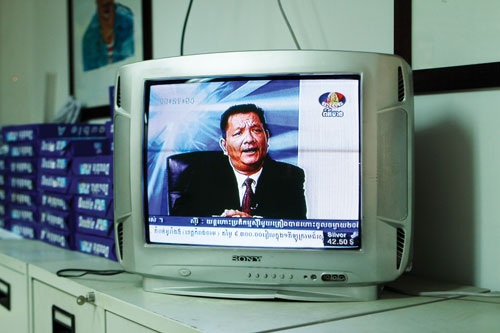Cambodia's political environment, a lack of professional journalists and financial instability are the key issues hampering independent media development in the Kingdom, a new report says.
The report, Challenges for Independent Media Development in Cambodia, was released late last month by the Cambodian Center for Independent Media (CCIM), which produces Voice of Democracy radio.
With the government controlling most of the country’s media through direct or indirect ownership, censorship or “influence by way of manipulation of the law”, truly independent reporting is hard to find, the study notes.
“For example, the widespread practice of self-censorship among Cambodian media professionals [is] borne out of a fear of being prosecuted for criminal offences under the country’s penal code for reporting on issues which highlight controversial activities by the government,” it says.
The report, Challenges for Independent Media Development in Cambodia, was released late last month by the Cambodian Center for Independent Media (CCIM), which produces Voice of Democracy radio.
With the government controlling most of the country’s media through direct or indirect ownership, censorship or “influence by way of manipulation of the law”, truly independent reporting is hard to find, the study notes.
“For example, the widespread practice of self-censorship among Cambodian media professionals [is] borne out of a fear of being prosecuted for criminal offences under the country’s penal code for reporting on issues which highlight controversial activities by the government,” it says.
Television and radio are by far the most influential media in Cambodia, with only two per cent of Cambodians regularly reading newspapers.
But, according to the report, of 160 registered radio stations, only two could be considered fully independent: CCIM’s Sarika FM (which broadcasts VOD) and Radio Beehive.
The latter’s outspoken owner, Mam Sonando, was arrested last year for stoking a so-called secessionist movement in Kratie province and sentenced to 20 years imprisonment in a case that was widely labelled as politically motivated.
The charges were lessened and he was freed last month after strong local and international condemnation, but he remains under parole for the next four-plus years.
With all 11 television stations associated with the government, meanwhile, and with pre-broadcast vetting of news bulletins, diversity in content and equal access to media for all political parties are also significant concerns.
A report published by election monitor Comfrel during the 2012 commune elections found the ruling CPP received more broadcasting time across all TV stations than any other party.
According to Freedom House’s 2013 Freedom of the Press Index, Cambodia’s media is considered as “Not Free”.
The Ministry of Information did not respond to requests for comment yesterday.

No comments:
Post a Comment